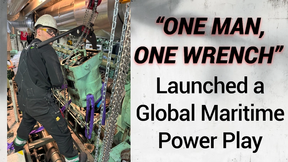Early in January HMAS Leeuwin set sail from Cairns to begin a transit to conduct military data gathering operations in the Bass Strait.
A number of Australian Navy Cadets and family members for ship's company joined the ship for the first day of the deployment.
The visitors were treated to a precise navigation pilotage from HMAS Cairns, through the Cairns channel and out to sea.
Once the ship had made it to sea a man overboard drill was undertaken with the 'man' recovered by the ship’s seaboat, and a blank firing demonstration took place to illustrate the procedure undertaken in case of a potential shark attack on personnel in the water.
Commanding Officer, Lieutenant Commander Adam Muckalt, said the "hands-on" experience was invaluable to increase understanding of what Navy people do out at sea.
"We gave demonstrations of various aspects of ship life, and gave them the opportunity to participate in a damage control scenario," he said.
"Being able to model firefighting equipment, and have some hands on work with fire hoses onboard really gave our guests an insight into some of the roles we need to be able to perform on the ship.
"We also treated them to dinner prepared by our chefs but with some helpful assistance from the Cadets!"
As the ship pulled into Flying Fish cove, a number of family members departed the ship via boat transfer, while the Cadets stayed on for the evening.
Through the night, the Cadets participated in a watch keeping routine, manning various areas of the ship for the entire evening, taking the helm and steering the ship, maintaining a proper lookout for contacts and other obstacles, and experiencing time in some of the machinery spaces.
The following morning, Leeuwin made its way towards Magnetic Island where the Cadets were landed via the ship’s jet RHIB in choppy and wet conditions.
Visits such as these are important to show life at sea to people considering joining the Navy and to meet sailors and officers who they may serve alongside in the future.
Additionally, welcoming family members onboard is equally important, as it can be hard to articulate what life at sea is like, and is great for sailors and officers alike to experience that with their family.



